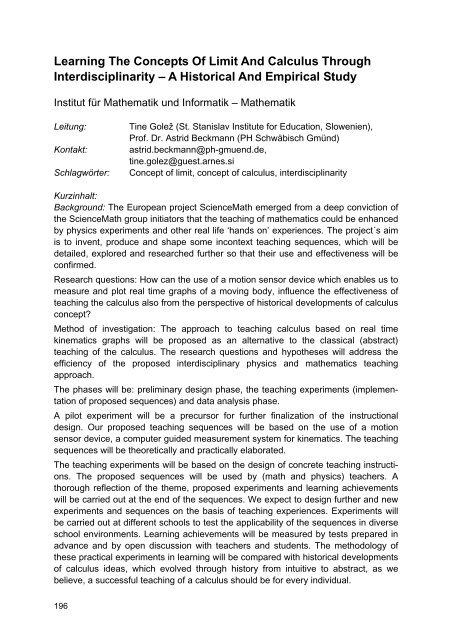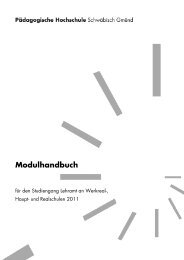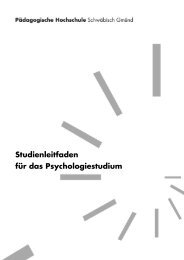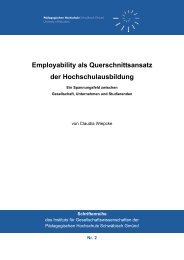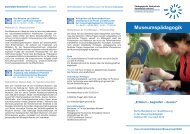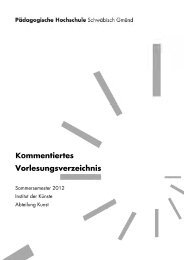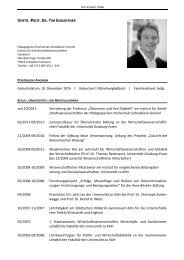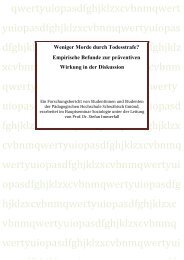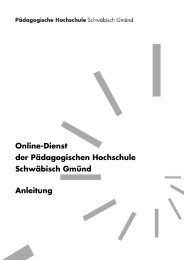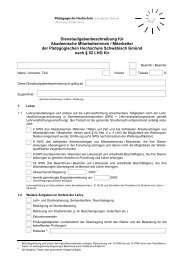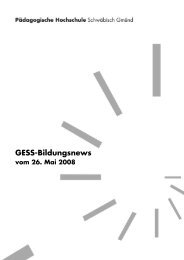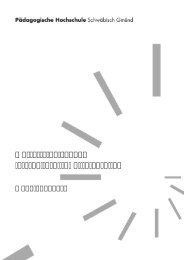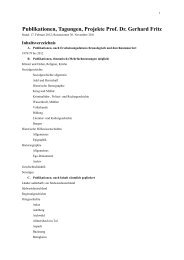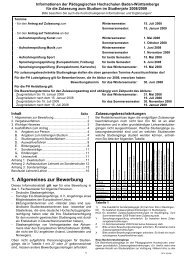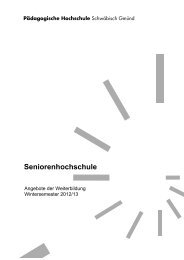Forschungsbericht 2008 - Pädagogische Hochschule - Schwäbisch ...
Forschungsbericht 2008 - Pädagogische Hochschule - Schwäbisch ...
Forschungsbericht 2008 - Pädagogische Hochschule - Schwäbisch ...
Erfolgreiche ePaper selbst erstellen
Machen Sie aus Ihren PDF Publikationen ein blätterbares Flipbook mit unserer einzigartigen Google optimierten e-Paper Software.
Learning The Concepts Of Limit And Calculus Through<br />
Interdisciplinarity – A Historical And Empirical Study<br />
Institut für Mathematik und Informatik – Mathematik<br />
Leitung: Tine Golež (St. Stanislav Institute for Education, Slowenien),<br />
Prof. Dr. Astrid Beckmann (PH <strong>Schwäbisch</strong> Gmünd)<br />
Kontakt: astrid.beckmann@ph-gmuend.de,<br />
tine.golez@guest.arnes.si<br />
Schlagwörter: Concept of limit, concept of calculus, interdisciplinarity<br />
Kurzinhalt:<br />
Background: The European project ScienceMath emerged from a deep conviction of<br />
the ScienceMath group initiators that the teaching of mathematics could be enhanced<br />
by physics experiments and other real life ‘hands on’ experiences. The project´s aim<br />
is to invent, produce and shape some incontext teaching sequences, which will be<br />
detailed, explored and researched further so that their use and effectiveness will be<br />
confirmed.<br />
Research questions: How can the use of a motion sensor device which enables us to<br />
measure and plot real time graphs of a moving body, influence the effectiveness of<br />
teaching the calculus also from the perspective of historical developments of calculus<br />
concept?<br />
Method of investigation: The approach to teaching calculus based on real time<br />
kinematics graphs will be proposed as an alternative to the classical (abstract)<br />
teaching of the calculus. The research questions and hypotheses will address the<br />
efficiency of the proposed interdisciplinary physics and mathematics teaching<br />
approach.<br />
The phases will be: preliminary design phase, the teaching experiments (implementation<br />
of proposed sequences) and data analysis phase.<br />
A pilot experiment will be a precursor for further finalization of the instructional<br />
design. Our proposed teaching sequences will be based on the use of a motion<br />
sensor device, a computer guided measurement system for kinematics. The teaching<br />
sequences will be theoretically and practically elaborated.<br />
The teaching experiments will be based on the design of concrete teaching instructions.<br />
The proposed sequences will be used by (math and physics) teachers. A<br />
thorough reflection of the theme, proposed experiments and learning achievements<br />
will be carried out at the end of the sequences. We expect to design further and new<br />
experiments and sequences on the basis of teaching experiences. Experiments will<br />
be carried out at different schools to test the applicability of the sequences in diverse<br />
school environments. Learning achievements will be measured by tests prepared in<br />
advance and by open discussion with teachers and students. The methodology of<br />
these practical experiments in learning will be compared with historical developments<br />
of calculus ideas, which evolved through history from intuitive to abstract, as we<br />
believe, a successful teaching of a calculus should be for every individual.<br />
196


